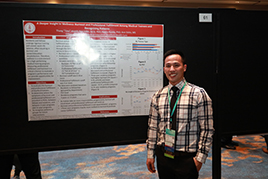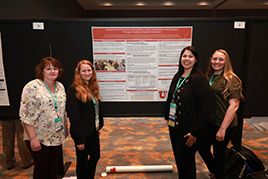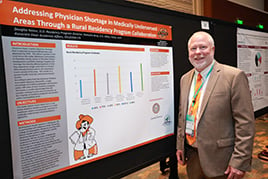
Call for Abstracts Information
Share your expertise with the GME community!
The Call for Abstracts for the 2024 ACGME Annual Educational Conference is closed.
Read the 2023 ACGME Annual Educational Conference Abstracts .
Each year the ACGME solicits abstract proposals to be shared as posters at its Annual Educational Conference. Below is key information for those considering submitting an abstract proposal.
When does the Call for Abstracts open?
The Call for Abstracts opens in late summer and closes in early fall each year. Specific dates will be announced in the ACGME’s weekly e-Communication and on the ACGME website, as well as on the ACGME’s social media accounts.
Who should submit an abstract?
The ACGME Annual Educational Conference is designed to educate designated institutional officials (DIOs), program directors, program and institutional coordinators, residents and fellows, faculty members, hospital administrators, and others in graduate medical education (GME). The aforementioned roles in GME are encouraged to submit an abstract.
What topics is the ACGME looking for?
Abstracts should focus on research or innovations in the areas of: accreditation; assessment; well-being; diversity, equity, and inclusion; teaching methodologies; resident/fellow education and development; crisis management; current issues in medicine and medical education; and other GME-related research and innovations in the clinical learning environment. Medical education outcomes-based research and evaluation are particularly encouraged.
What are the criteria for selection?
-
Contact information for each author (required)
Note: All abstract proposals go through a blind selection process and personal identifiers will be removed from submission when being reviewed. -
Is the project innovation- or research-focused? (required)
Research abstracts include completed studies or investigations, with measurable results, that offer new conclusions that contribute to GME research and practice.
Innovation abstracts include completed programs, projects, or strategies, with measurable results, that share best practices and practical insights with the GME community.
-
Abstract title (required)
-
Background, Objectives, Methods, Results/Outcomes/Improvements, Significance/Implications/Relevance. (There are five sections to this criterion) Note: No charts, tables, or graphs are accepted with submissions. (required)
Background: clearly articulated context for project or research study, including relevant literature (limited to 1,000 characters, including spaces)
Objectives: substantive, clearly stated purpose of the project or research study (limited to 1,000 characters, including spaces)
Methods: clear description of how the project or research study was conducted and/or implemented, with sound and appropriate project/study design (limited to 1,000 characters, including spaces)
Results/Outcomes/Improvements: clear and unambiguous statement of what changed and how (limited to 1,000 characters, including spaces)
Significance/Implications/Relevance: implications of the project or research study beyond the local setting (limited to 1,000 characters, including spaces) -
References (optional)
When are posters presented?
Accepted abstract posters are presented during the Marvin R. Dunn Poster Reception and Exhibitor Kick-Off, which takes place on the Thursday evening of the Annual Educational Conference. At least one author of an accepted abstract must be available to discuss the poster during the Reception. Posters will be available for viewing throughout the conference by attendees on their own time.
Do authors representing a poster need to register for the conference?
All authors representing a poster must register for the conference.
More information will be available when the Call for Abstracts opens for the 2025 Annual Educational Conference.
The ACGME does not endorse any products or services provided by outside vendors. Therefore, promotions or advertisements of any kind are not allowed at the conference. Discussion must be limited to desired operational solutions contained in the software with no mention of proprietary products.



